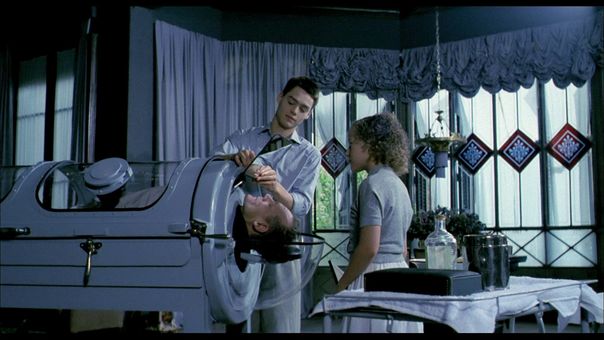The Artificial Life of the Spirit
Samuel Lagunas

Tras el cristal
Sometimes the spirit dies before the body: it happens in wars, in genocides, in rapes. In IN A GLASS CAGE, the body of the German doctor Klaus (Günter Meisner) continues to exist thanks to an iron lung that protects him and allows him to breathe. The father of Rena (Gisela Echavarría) and the husband of Griselda (Marisa Paredes), Klaus spends his days reduced to being a spectator of his caretakers, while able occasionally, thanks to a mirror, to direct his gaze inward. But there is also the unexpected male nurse Angelo (David Sust), with his vampire look, his inert spirit, and his own body reduced to the echoes of atrocious childhood experiences.
As if in a brief history of twentieth-century Germany, the expressionist esthetic that defines the spaces in the first act is replaced thereafter by a uniform grille that isolates the house from all forms of life. This new stage is the setting for the macabre game dominated by Angelo who, determined to suck up Klaus’s life, will replicate before the viewer’s ambiguous gaze the actions he reads in an old diary. How we are to watch and participate in this game is the most urgent question the film continues to pose.
In his dissection of evil, Villaronga not only gives us one of the bitterest metaphors of sexual abuse (an injection of gasoline into the chest), but also exhumes, in oracular fashion, the bodies of a humanity whose spirit was annihilated in Auschwitz and whose frail and mechanical death rattle fills with its sound this shared house we call history.
(translated by Gregory Dechant)

